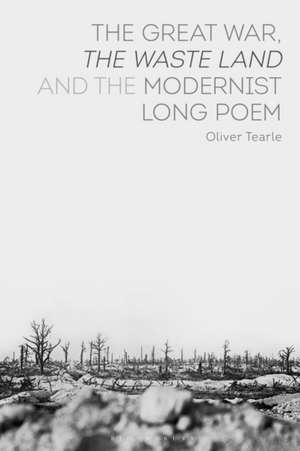The Great War, The Waste Land and the Modernist Long Poem
Autor Dr Oliver Tearleen Limba Engleză Paperback – 22 iul 2020
| Toate formatele și edițiile | Preț | Express |
|---|---|---|
| Paperback (1) | 223.28 lei 6-8 săpt. | |
| Bloomsbury Publishing – 22 iul 2020 | 223.28 lei 6-8 săpt. | |
| Hardback (1) | 656.06 lei 6-8 săpt. | |
| Bloomsbury Publishing – 9 ian 2019 | 656.06 lei 6-8 săpt. |
Preț: 223.28 lei
Preț vechi: 288.12 lei
-23% Nou
Puncte Express: 335
Preț estimativ în valută:
42.73€ • 44.34$ • 35.71£
42.73€ • 44.34$ • 35.71£
Carte tipărită la comandă
Livrare economică 17-31 martie
Preluare comenzi: 021 569.72.76
Specificații
ISBN-13: 9781350178175
ISBN-10: 1350178179
Pagini: 208
Dimensiuni: 156 x 234 x 16 mm
Greutate: 0.3 kg
Editura: Bloomsbury Publishing
Colecția Bloomsbury Academic
Locul publicării:London, United Kingdom
ISBN-10: 1350178179
Pagini: 208
Dimensiuni: 156 x 234 x 16 mm
Greutate: 0.3 kg
Editura: Bloomsbury Publishing
Colecția Bloomsbury Academic
Locul publicării:London, United Kingdom
Caracteristici
Reads Eliot's masterpiece against other examples of the genre by the likes of Hope Mirrlees, Ezra Pound, Richard Aldington and Nancy Cunard
Notă biografică
Oliver Tearle is Lecturer in English at Loughborough University, UK. He is the author of T.E. Hulme and Modernism (Bloomsbury, 2013).
Cuprins
1. Introduction 2. Origins 3. 'Modernism's Lost Masterpiece': Hope Mirrlees, Paris: A Poem 4. 'The Age Demanded': Ezra Pound, Hugh Selwyn Mauberley 5. To Carthage: T. S. Eliot, The Waste Land 6. Paralysed Form: T. S. Eliot, 'The Hollow Men' 7. Arden to Ardennes: Richard Aldington, A Fool I' the Forest 8. The 'Emotions of Aftermath': Nancy Cunard, Parallax 9. AfterwordNotesBibliographyIndex
Recenzii
[The Great War, The Waste Land and the Modernist Long Poem] virtues at both the micro and macro levels-its trenchant close readings and synoptic scope-recommend it to any serious reader of T. S. Eliot.
Draws pleasingly together canonical texts and works by under-analyzed modernist authors, offering for the first time a focused account of this form of post-war writing ... This book will be useful to scholars in First World War and modernist studies, and the well-defined and effectively developed central concepts of the long poem and homorhyme might also be used profitably in other contexts.
Oliver Tearle has done a good and timely job on bringing his reader back into the micro-climate of the poetry produced at the time by some of the twentieth century giants such as TS Eliot and Ezra Pound and their lesser known (today) contemporaries, including Ford Madox Ford (Antwerp, 1915), Hope Mirrlees (Paris: A Poem, 1920), Richard Aldington, (A Fool I' the Forest: A Phantasmagoria (1925) - from As You Like It: "A fool, a fool! I met a fool i' the forest, / A motley fool; a miserable world!") and Nancy Cunard, (Parallax, 1925).
In this engaging, learned study, Oliver Tearle takes for his subject what he calls a "miniature genre-within-a-genre," the modernist long poem, and he seeks to explore the relation of this genre to the Great War.His book provides an excellent introduction to all six poems. If at first this seems most valuable when it comes to Paris, A Fool i' the Forest, and Parallax, the whole is yet greater than the parts, for the book offers a rich and compelling picture of modernist poetry in the decade after the Great War.
Draws pleasingly together canonical texts and works by under-analyzed modernist authors, offering for the first time a focused account of this form of post-war writing ... This book will be useful to scholars in First World War and modernist studies, and the well-defined and effectively developed central concepts of the long poem and homorhyme might also be used profitably in other contexts.
Oliver Tearle has done a good and timely job on bringing his reader back into the micro-climate of the poetry produced at the time by some of the twentieth century giants such as TS Eliot and Ezra Pound and their lesser known (today) contemporaries, including Ford Madox Ford (Antwerp, 1915), Hope Mirrlees (Paris: A Poem, 1920), Richard Aldington, (A Fool I' the Forest: A Phantasmagoria (1925) - from As You Like It: "A fool, a fool! I met a fool i' the forest, / A motley fool; a miserable world!") and Nancy Cunard, (Parallax, 1925).
In this engaging, learned study, Oliver Tearle takes for his subject what he calls a "miniature genre-within-a-genre," the modernist long poem, and he seeks to explore the relation of this genre to the Great War.His book provides an excellent introduction to all six poems. If at first this seems most valuable when it comes to Paris, A Fool i' the Forest, and Parallax, the whole is yet greater than the parts, for the book offers a rich and compelling picture of modernist poetry in the decade after the Great War.
